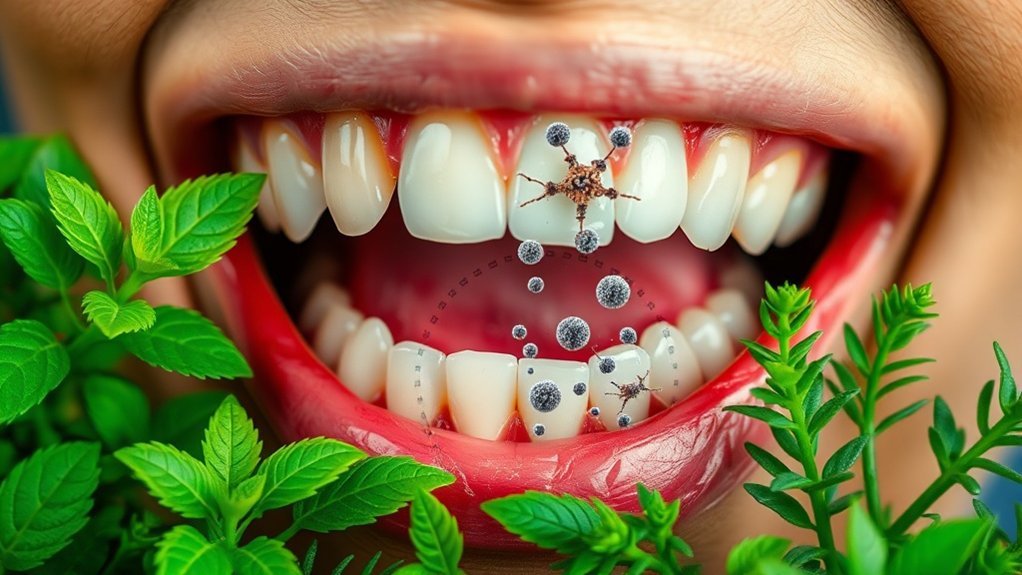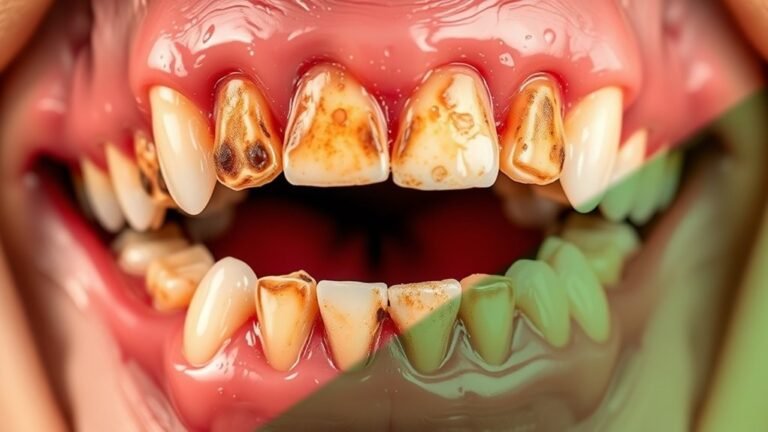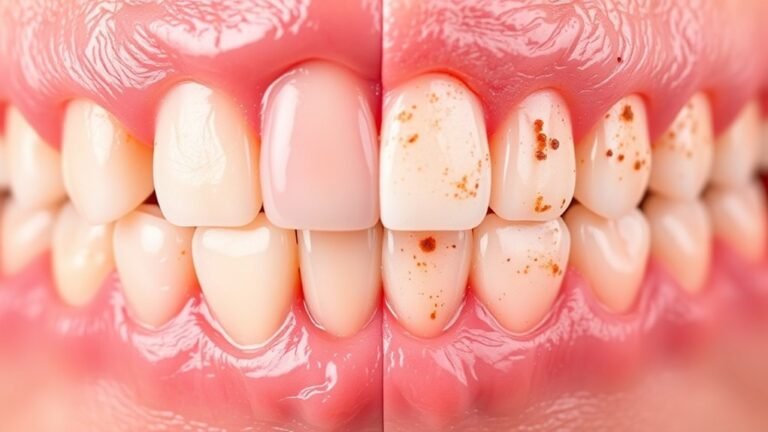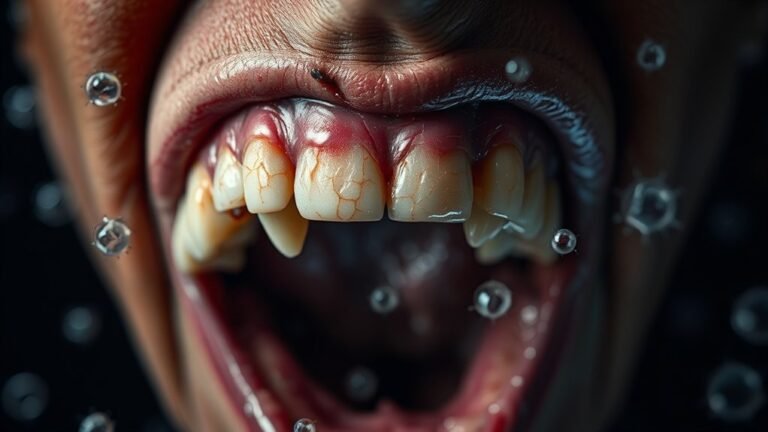Can Antibiotics Alone Cure Chronic Oral Bacterial Infections or Imbalance
Antibiotics alone can’t cure chronic oral bacterial infections or imbalances. While they help manage specific bacterial pathogens, they must be part of a broader treatment strategy. Proper oral hygiene, regular dental check-ups, and adjunctive therapies are essential for effective management. Over-reliance on antibiotics may also contribute to resistance, making future infections harder to treat. To fully understand how to achieve ideal oral health, consider additional information on thorough care approaches.
Key Takeaways
- Antibiotics can reduce bacterial load but do not address underlying issues like poor oral hygiene or untreated dental problems.
- Effective treatment of chronic infections often requires a combination of antibiotics and improved oral care practices.
- Antibiotics alone may not eliminate biofilms, which protect bacteria and complicate the resolution of infections.
- Resistance can develop if antibiotics are misused, making them less effective for future infections.
- Regular dental check-ups and adjunctive therapies are crucial for comprehensive management of oral health.
Understanding Chronic Oral Bacterial Infections
Chronic oral bacterial infections, often stemming from untreated dental issues or poor oral hygiene, can greatly impact your overall health. These chronic oral infections can lead to systemic complications, including cardiovascular diseases and diabetes. The bacteria involved, such as Porphyromonas gingivalis, can enter the bloodstream, causing inflammation and exacerbating existing health conditions. Symptoms may include persistent gum inflammation, bad breath, and tooth mobility, indicating an ongoing infection. Early intervention is vital; without proper treatment, these infections can progress, leading to more severe issues, such as periodontitis. Maintaining good oral hygiene practices, including regular dental check-ups and effective brushing and flossing, is essential in preventing chronic oral infections and safeguarding your overall health.
The Role of Antibiotics in Treating Oral Conditions
Antibiotics play a significant role in managing oral bacterial infections, particularly when conventional treatments alone are insufficient. They target specific pathogens, helping to reduce inflammation and promote healing. However, it’s essential to use them judiciously to avoid resistance.
| Antibiotic Class | Common Uses |
|---|---|
| Penicillins | Treat dental abscesses |
| Tetracyclines | Manage periodontal disease |
| Macrolides | Address soft tissue infections |
| Clindamycin | Treat jaw infections |
When you consider antibiotics for oral conditions, it’s vital to consult your healthcare provider to tailor the treatment to your specific needs, ensuring effectiveness and minimizing side effects. Antibiotics can be a powerful ally, but they must be used appropriately.
Factors Influencing the Effectiveness of Antibiotics
When considering the effectiveness of antibiotics for oral bacterial infections, several factors come into play that can significantly influence treatment outcomes. Understanding these factors is essential, especially in cases of bacterial imbalance.
Several key factors influence the effectiveness of antibiotics for oral bacterial infections, particularly in addressing bacterial imbalances.
- Antibiotic Spectrum: The choice of antibiotic must target the specific bacteria causing the infection.
- Dosage and Duration: Adhering to prescribed dosages and treatment duration can help prevent treatment failure.
- Patient’s Immune Response: An individual’s immune system plays a significant role in fighting infections and can affect antibiotic efficacy.
Risks of Antibiotic Resistance in Oral Health
As bacterial infections in the oral cavity become more common, the risk of antibiotic resistance escalates, posing significant challenges to effective treatment. Overusing or misusing antibiotics can lead to the development of resistant strains, making infections harder to treat. Studies show that approximately 30% of antibiotic prescriptions in dental practices may be unnecessary, contributing to this alarming trend. When bacteria mutate, they can survive standard treatments, resulting in prolonged infections and potential complications. You may find that common pathogens like Streptococcus and Staphylococcus evolve resistance, diminishing the efficacy of previously effective antibiotics. This situation not only affects individual patients but also public health, as resistant bacteria can spread within communities. Awareness of antibiotic resistance is essential for maintaining oral health and ensuring future treatment options.
A Comprehensive Approach to Oral Health Management
Addressing antibiotic resistance in oral health requires a multi-faceted strategy that emphasizes prevention, early intervention, and effective management of oral diseases. To combat oral biofilm formation, it’s essential to implement thorough measures that go beyond antibiotics.
- Promote daily oral hygiene practices, including proper brushing and flossing.
- Regular dental check-ups for early detection and treatment of bacterial infections.
- Use adjunctive therapies, such as antimicrobial mouth rinses, to disrupt biofilm development.
Frequently Asked Questions
Can Over-The-Counter Antibiotics Treat Chronic Oral Infections Effectively?
Over-the-counter antibiotics typically aren’t effective for chronic oral infections. These conditions often require prescription-strength medications or targeted treatments. Consult your dentist for a thorough evaluation and appropriate treatment options tailored to your specific needs.
How Long Does Antibiotic Treatment Typically Last for Oral Infections?
Antibiotic treatment for oral infections typically lasts around seven to ten days. However, your doctor might adjust this duration based on your specific infection’s severity, response to treatment, and any underlying health conditions.
Are There Natural Alternatives to Antibiotics for Oral Bacterial Infections?
Yes, there are natural alternatives like probiotics, garlic, and oil pulling that may help combat oral bacterial infections. However, it’s essential to consult a healthcare professional before using these methods as substitutes for antibiotics.
Can Antibiotics Affect My Oral Microbiome Balance Negatively?
Sure, antibiotics can disrupt your oral microbiome balance, ironically targeting harmful bacteria while simultaneously diminishing beneficial ones. This disruption can lead to further imbalances, highlighting the need for careful consideration when using these medications for oral health.
What Symptoms Indicate the Need for Antibiotics in Oral Infections?
If you experience severe pain, swelling, fever, or persistent redness in your gums, it’s time to reflect on antibiotics. Additionally, if there’s an abscess or difficulty swallowing, seeking medical advice is essential for proper treatment.
Conclusion
In conclusion, while antibiotics can be a valuable ally in your battle against chronic oral bacterial infections, they’re often not a one-size-fits-all solution. Combining them with good oral hygiene and regular dental check-ups guarantees a more holistic approach to your oral health. By addressing the underlying issues and avoiding the pitfalls of antibiotic resistance, you can pave the way for a healthier smile that lasts. Remember, an all-encompassing strategy is your best bet for lasting oral well-being.






